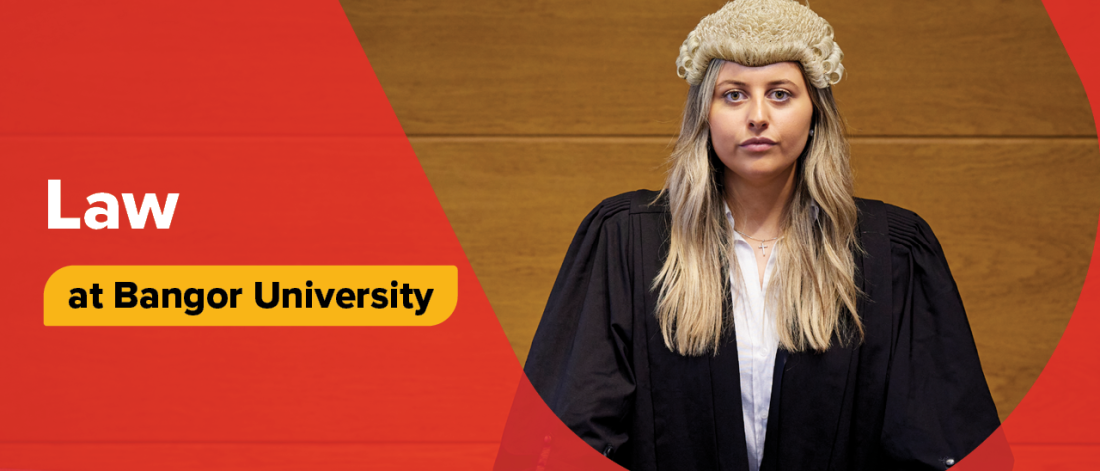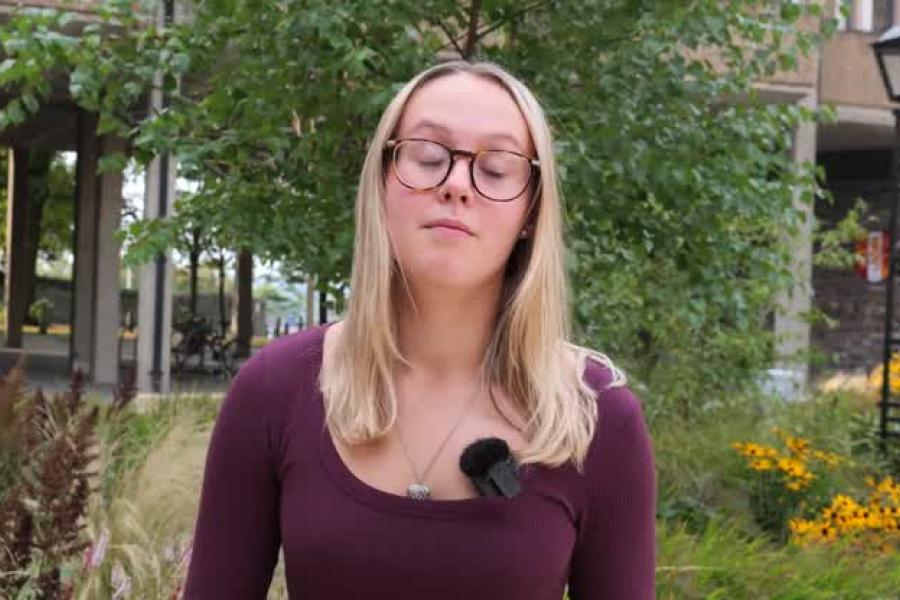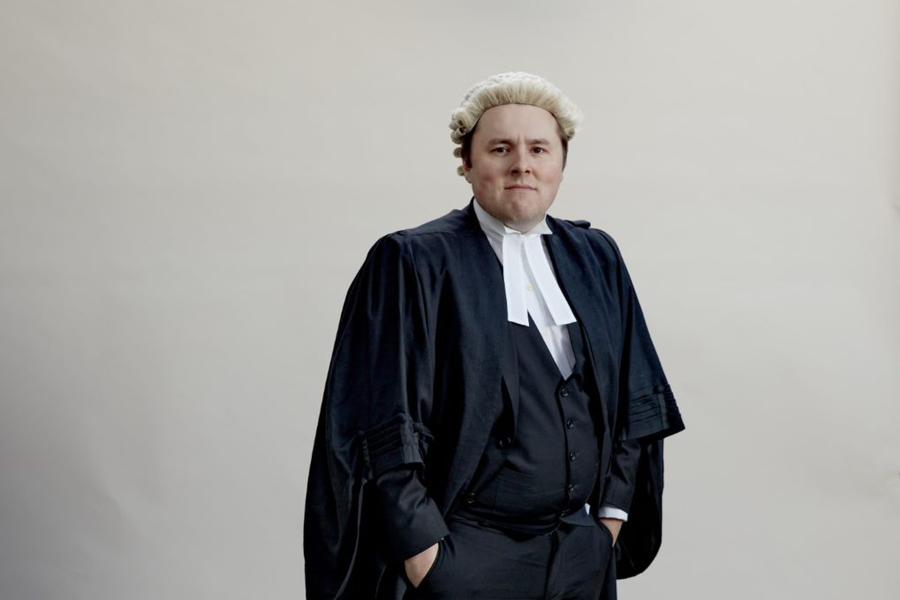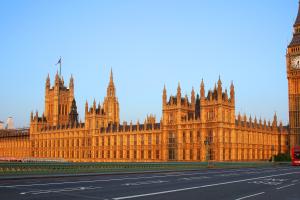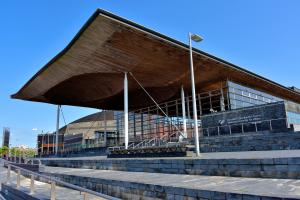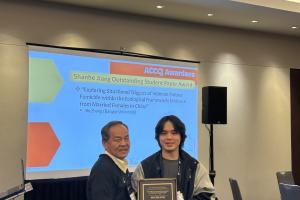Find the right Law course for you
Justice in Action: Learning, leading and changing lives together
[VISUAL DECRIPTION] Group of three students wearing law gowns walking into the Main Arts Courtyard with a majestic view of the Main University Building in the background.
[VOICEOVER] At Bangor University, we’re much more than just students and lecturers.
[VISUAL DECRIPTION] Student sat at table at Cegin Cafe holding a pen with paper on the table laughing and chatting to a lecturer and another student. Two students sat in the Shankland Library chatting and smiling at each other with books and laptops on the desk whilst another student is busy writing on a desk in the background. Lecturer sits in front of a red backdrop talking to camera.
[VOICEOVER] We’re a community really shaping the future of justice.
[VISUAL DECRIPTION] Lecturer talking to camera sat in front of a red backdrop. In bottom left hand corner text appears reading Dr Hayley Roberts, Reader in Public International Law. Camera pans across the Mock Court Room from the audience with students sat watching two other students practicing to moot.
[VOICEOVER] Our size is one of our strengths, so you get that big university experience, amazing opportunities like the law clinic, mooting and options to study abroad, but in a supportive, intimate setting.
[VISUAL DECRIPTION] Student talking to camera in front of red backdrop whilst text appears in the bottom left hand corner reading Holly Jones, Undergraduate Student LLB Law.
[VOICEOVER] The community in Bangor is amazing. The Law Society often offers exciting events and the sports clubs are great here. The connection between the students and the teachers here and the support available is amazing. Here at Bangor, I'm more than just a number. I'm a name, a person and a valued member of the community.
[VISUAL DECRIPTION] Lecturer appears on screen talking to camera in front of red backdrop. In bottom left hand corner text appears reading Tracey Horton, Director of Bangor University Legal Advice Clinic.
[VOICEOVER] At Bangor University Legal Advice Clinic, the students are really putting into practice what they learn in the classroom.
[VISUAL DECRIPTION] Two students walk engaging in conversation in Bangor High Street with a range of vibrant shops and cafes in the background.
[VOICEOVER] The location of Bangor University Legal Advice Clinic I think makes it unique and unparalleled.
[VISUAL DECRIPTION] Both students walk into Bangor Legal Advice Clinic, located in the middle of the high street.
[VOICEOVER] We are not on campus, we are in the heart of our community on Bangor High Street.
[VISUAL DECRIPTION] Bangor University Legal Advice Clinic flyer appears on screen. A student welcomes a client into the Legal Advice Clinic.
[VOICEOVER] Being part of the Law Clinic has been an incredible experience, allowing me to apply my legal knowledge in real life cases.
[VISUAL DECRIPTION] Two students and Tracey Horton with laptops around a table chatting with the client in a meeting room in the Legal Advice Clinic.
[VOICEOVER] I have developed my communication skills and my emotional resilience by actively working alongside clients who are often vulnerable and stressed.
[VOICEOVER] These are skills you wouldn’t learn in the classroom alone.
[VISUAL DECRIPTION] Dr Hayley Roberts talking to camera in front of a red backdrop.
[VOICEOVER] Our lecturers are experts in their field, so you know that you're being taught by people that are shaping government policy, that are having a real impact on people and making a difference worldwide.
[VISUAL DECRIPTION] Tracey Horton typing on computer in Legal Advice Clinic.
[VISUAL DECRIPTION] Student talking to camera in front of red backdrop. Text appears in the bottom left corner of the screen reading Owain Evans, Undergraduate Student LLB Law.
[VOICEOVER] Their teaching and industry connections have given me real insight into the legal world and given me some amazing opportunities.
[VISUAL DECRIPTION] Student Holly in front of red backdrop is talking to camera. Two students are practicing mooting in the mock court room. Student holding folders looking directly to camera with mock courtroom in the background.
[VOICEOVER] From asking questions in a client interview competition to being a claimant in a mock employment tribunal.
[VISUAL DECRIPTION] Dr Hayley Roberts talking to camera in front of red backdrop.
[VOICEOVER] Studying law at Bangor opens doors to so many career options,
[VISUAL DECRIPTION] Stock video of office building in large city.
[VOICEOVER] from local solicitors to city firms, barristers chambers,
[VISUAL DECRIPTION] Stock video of files and papers on table.
[VOICEOVER] international organisations and social justice roles.
[VISUAL DECRIPTION] Dr Hayley Roberts talking to camera in front of red backdrop. Different employer stands with pop up banners and employers chatting to students at the employability fair. Student with leaflets chatting to employers at the fair.
[VOICEOVER] Our strong links with the legal profession and beyond give you access to exclusive internships, placements, networking with guest speakers and access to our vibrant Careers Fair.
[VISUAL DECRIPTION] Tracey Horton talking to camera in front of red backdrop.
[VOICEOVER] At Bangor University, we don't just teach law.
[VOICEOVER] We create opportunities for our students, we build futures and we are creating the legal leaders of the future.
[VISUAL DECRIPTION] Dr Hayley Roberts talking to camera in front of red backdrop.
[VOICEOVER] Justice in Action: Learning, leading and changing lives together.
[VISUAL DECRIPTION] Camera pans across the Main Arts Courtyard with three students wearing their legal gowns and holding books walking across the outdoor space with the majestic Main University Building in the background. University crest appears.
[VISUAL DECRIPTION] Two students walking through Bangor High Street with a variety of cafes and shops in the background.
[VOICEOVER] I didn't really want the clinic to be on campus.
[VOICEOVER] I wanted to it to be in the heart of the community.
[VISUAL DECRIPTION] Both students walk into the University's Legal Advice Clinic in the middle of the High Street.
[VOICEOVER] So we're really trying to bring the university into the high street.
[VISUAL DECRIPTION] Lecturer sat talking to camera.
[VOICEOVER] So I think that is quite a big distinction from other university clinics.
[VISUAL DECRIPTION] Two students walking into the University's Legal Advice Clinic. The Legal Advice Clinic's flyer is held to camera with the text Bangor University Legal Advice Clinic, Free Legal Advice Clinic provided by the Law students at Bangor. A student welcomes a client into the legal advice clinic.
[VOICEOVER] The University Law Clinic is students giving free legal advice to members of the public.
[VISUAL DECRIPTION] A lecture is talking to camera. In the bottom left hand corner text appears reading Tracey Horton, Director of Bangor University Legal Advice Clinic. Student walks client to meeting room in the Legal Advice Clinic. Two students sat around table with lecturer talking notes on laptop whilst client is talking to them.
[VOICEOVER] So the client will be interviewed by two students, I sit in on all the interviews, no advice given on the day students go away, carry out some research and a detailed letter of advice is sent out to the client within 14 days.
[VISUAL DECRIPTION] Tracey Horton is typing on laptop whilst client is talking in the background.
[VOICEOVER] It's great for employability skills so they can hit the ground running - employers love clinic!
[VISUAL DECRIPTION] Student is talking to camera. In the bottom left hand corner text appears reading Eloïse Bordet, Undergraduate Student LLB Law.
[VOICEOVER] I chose to take part in clinic because I wanted to gain practical experience.
[VISUAL DECRIPTION] Two students and Tracey Horton chatting to client in Legal Advice Clinic taking notes on laptop.
[VOICEOVER] I wanted to apply the knowledge I’ve gained throughout my studies.
[VISUAL DECRIPTION] Student Eloïse Bordet is talking to camera.
[VOICEOVER] I think it's a great environment to learn, it's really helpful for us students, but also for our community.
[VISUAL DECRIPTION] Student is talking to camera. In bottom left hand corner text appears reading Tom Jarman, Undergraduate Student LLB Law.
[VOICEOVER] I didn't think I’d be able to sit in front of people from the local area and ask them about their problems and interview them.
[VISUAL DECRIPTION] Client chatting to students in the Legal Advice Clinic. Two students and Tracey Horton talking notes on laptop chatting to client. Student Tom Jarman is talking to camera.
[VOICEOVER] That’s really improved through clinic and I think things like note taking, letter writing, which you don’t really get from your law degree, you do a lot of assignments and exams, but nothing really practical and I think it's really helped that side of things.
[VISUAL DECRIPTION] Student Eloïse Bordet is talking to camera. Both students are walking through Bangor High Street with a variety of shops in the background. Client is chatting to Tracey Horton and students in the Legal Advice Clinic.
[VOICEOVER] As an international student, I was obviously kind of scared before starting but we do get a lot of support from Tracey, our supervising solicitor and from the university as well.
[VISUAL DECRIPTION] Student Eloïse Bordet is talking to camera.
[VOICEOVER] The clinic experience is going to make us more employable.
[VISUAL DECRIPTION] Client is chatting to Tracey Horton and students in the Legal Advice Clinic.
[VOICEOVER] And it's really going to help in the future in any jobs that involve communication and legal research skills and legal writing skills as well.
[VISUAL DECRIPTION] Tracey Horton is talking to camera.
[VOICEOVER] There's a real gap in the market within North Wales for free legal advice.
[VOICEOVER] In addition to that, there's not that many firms now that have got legal aid contracts.
[VISUAL DECRIPTION] Client is chatting to students in the Legal Advice Clinic.
[VOICEOVER] Citizens Advice Bureaus are absolutely inundated and can't cope with the demand. So it was a real need for the local community to have a clinic like this.
[VISUAL DECRIPTION] Student Eloïse Bordet is talking to camera.
[VOICEOVER] My advice would be to seize the opportunity. Don't be afraid to be curious. Don't be afraid to ask questions.
[VISUAL DECRIPTION] Client is sat chatting to Tracey Horton and students in the Legal Advice Clinic whilst they they make notes on laptops.
[VOICEOVER] The clinic is a great way to gain legal experience while helping the community.
[VISUAL DECRIPTION] University crest appears reading Prifysgol Bangor University.
[VISUAL DECRIPTION] Student is talking to camera with a view of some trees and greenery in the background. Camera pans to view of the Main University Building.
[VOICEOVER] My full name is Holly Alicia Jones. I'm from Criccieth in North Wales. I'm in my second year and I'm studying in LLB law. I chose Bangor University for a range of reasons.
[VISUAL DECRIPTION] Student is talking to camera.
[VOICEOVER] I'd heard a lot of good things about the course I've chosen. I've heard that many clubs and societies to offer, and a nice small university community so I can make friends easily.
[VISUAL DECRIPTION] Camera pans across a busy lecture theatre.
[VOICEOVER] The coolest is part of my course for me as a Welsh person is being able to connect with Welsh students through tutorials.
[VISUAL DECRIPTION] Student is talking to camera.
[VOICEOVER] They offers all tutorials for my course through the medium of Welsh, so I was able to connect with other Welsh students and learn together through, um, most comfortable language.
[VISUAL DECRIPTION] Two student in Moot Courtroom practicing to moot.
[VOICEOVER] There are so many things I love about law. I'd say probably the best thing is being able to argue with people I've always loved to argue, and law is such an area of debate.
[VISUAL DECRIPTION] Student is talking to camera.
[VOICEOVER] Our lecturers always asking us questions on what we think about the law. We're able to talk about reforms in the way the law should change and develop.
[VISUAL DECRIPTION] A group of four students are sat outside chatting to each other with a view of Bangor city in the background.
[VOICEOVER] There are so many things I love about Bangor. However, I would probably say the small community is the best thing.
[VISUAL DECRIPTION] Student is talking to camera.
[VOICEOVER] Many unis are huge and overwhelming, but Bangor is a lovely small community, so you're able to connect with your friends easily and no one's too far from you.
[VISUAL DECRIPTION] Students at a law fair chatting to employers whilst other students in the background are busy walking around the fair that has employer stands.
[VOICEOVER] A piece of advice I would give to new students is attend things.
[VISUAL DECRIPTION] Student is talking to camera.
[VOICEOVER] Go to serendipity. Go and look at the stalls of the clubs and societies that you're interested in joining those kind of things and finding people with similar interests to you is such a good way to make friends, and the opportunities are there for you to take them.
[VISUAL DECRIPTION] University crest appears reading Prifysgol Bangor University.
Tour our Mock Court Room
What is Mooting?
If you’re looking to study Law, you may have heard about mooting, but do you know what mooting is? Essentially mooting is a mock trial where two sides argue a point of law in front of an acting judge. The judge will then decide who the winner is once they’ve heard presentations from both sides.
If you’re thinking of becoming a solicitor or barrister mooting is an important skill to have. Studying LLB Law at Bangor allows you the opportunity to practice your mooting in our on-campus mock courtroom.
Taking part in mooting is a great way to acquire skills you need to become a lawyer. It helps develop legal skills, analysis skills and interpretation skills. Practicing mooting will help you become more confident and build your personal skills of public speaking. Mooting enables students to;
- explore, argue and critique complex areas and arguments in the law
- enhance their advocacy, legal research and writing skills
- work closely with peers
- practice engaging with the bench and become more confident in arguing their case.
As a smaller school we're able to offer students more opportunities to moot than other institutions. Law students at Bangor will argue a fictitious legal case within simulated court proceedings. Two pairs of advocates – the Appellants and Respondents – contest the case in front of a 'judge', normally a lecturer or postgraduate student. The winning team is not necessarily the one that wins the case, but the team that makes the best presentation of their legal arguments.
Solicitors Qualifying Exam (SQE)
Do you want to become a Solicitor? If so you'll need to undertake the Solicitors Qualifying Exam. All Bangor’s LLB degrees are ‘SQE facing’, meaning that our degrees contain a pathway that will allow you to study the material tested on the Solicitor’s Qualifying Exam (‘SQE’).
An SQE Facing degree essentially means that you'll be studying a degree programme that has the option for you to continue your training and become a solicitor. To do so you'll need to sit the Solicitors Qualifying Exam (SQE) which is the centralised assessment for anyone who wants to qualify as a solicitor in England and Wales. The SQE is part of a four-stage route to becoming a solicitor.
All Bangor’s LLB degrees are ‘SQE facing’. This means that our degrees contain a pathway, allowing you to study the material tested on the Solicitor’s Qualifying Exam (‘SQE’). Whether you choose an SQE pathway or not, all our LLB degrees go further, by combining these ‘SQE ready’ elements with a critical and academic study of the law to understand the role of law in society and address contemporary legal issues. This is achieved through both the core and the optional modules available on Bangor’s LLB degrees.
From September 2021, the Solicitors Qualifying Exam (SQE) is the new assessment that those who wish to qualify as a solicitor must pass. This replaces the qualifying law degree and the Legal Practice Course. The process to qualify as a barrister remains unchanged.
The SQE has two elements, SQE1 and SQE2. SQE1 must be completed before SQE2.
There are two elements to SQE1, FLK 1 and FLK2. These both test your understanding of ‘functional legal knowledge’, through 180 multiple choice questions split into two sessions.
FLK 1 tests the subject areas below;
- Business Law and Practice
- Dispute Resolution
- Contract
- Tort
- Legal System of England and Wales
- Constitutional and Administrative Law and EU Law and Legal Services
FLK 2 tests the following subject areas:
- Property Practice
- Wills and the Administration of Estates
- Solicitors Accounts
- Land Law
- Trusts
- Criminal Law and Practice
Ethics and Professional Conduct is examined ‘pervasively’ across FLK 1 and FLK 2, meaning it can arise in any question.
To pass SQE1, you must pass both FLK1 and FLK2. The assessments take place in January and July each year.
SQE2 is a skills-based assessment which covers the following skills.
- Client interview and attendance note/legal analysis
- Advocacy
- Case and matter analysis
- Legal research
- Legal writing
- Legal drafting
In all of Bangor’s LLB degrees, students get an opportunity to experience and learn these skills across the core modules.
Our recommendation is that following the completion of a Bangor LLB, students undertake short SQE preparation course, to prepare for the specific nature of the SQE1 and SQE2 examinations.
For more information regarding the SQE, please consult the website of the Solicitor Regulation Authority.
Do you have a question about life as a Bangor University student? Our ambassadors will be happy to help you find the answer.
They can tell you more about studying here, about the amazing Clubs and Societies we have, and how they made friends and settled in to life at university as a Law student.
If you have any questions about the course, our lecturers are on hand to help. Below are some examples of frequently asked questions. Can you think of any more?
- What are the qualities of a successful Law student at Bangor?
- How can I prepare myself to study Law at Bangor?
- How will I know that Law at Bangor is the right choice for me?
Studying Law - what are LLB Law Degrees?
The LLB degree is probably the most common type of undergraduate law degree, and is studied by undergraduates seeking to practice in law as well as those students who eventually enter into other non-law related professions. LLB degrees are well regarded as rigorous degrees that train graduates for a wide range of career opportunities.
The LLB is a three-year qualifying law degree which leads you to the next stage of training within the legal profession you can follow the SQE route for solicitors or the BPTC for barristers.
An LLB programme will look at different areas of the Law examples include Public Law, Contract Law, Criminal Law, Tort Law, Land Law and the UK, EU Law and Brexit. As part of your LLB degree you’ll be able to choose optional modules in areas that you have an interest in and may want to pursue in the future. At Bangor our academics have a range of interests within Law that include topics such as Family and Welfare Law, Sports Law, Media Law, Intellectual Property Law, Commercial Law, Law and Technology, Environmental Law and Endangered Wildlife and International Law.
Every Bangor LLB degree is SQE Facing which means that our degrees contain a pathway, allowing you to study the material tested on the Solicitor’s Qualifying Exam (‘SQE’).
Whilst providing a thorough foundation in the fundamentals of law, Bangor LLB degrees also reflect the legal environment of the 21st century by focusing on developing the legal skills required not only in the UK but also in Europe and the wider international community.
In the latest National Students Survey (2022), Bangor University was awarded an impressive 84% student satisfaction rating in the subject area of Law, highlighting the high level of support and smaller class sizes offered at Bangor compared to other larger UK law schools.
If you'd like to studying another subject in addition to Law, but you also want to ensure you study a Qualifying Law Degree, then you should consider one of our 'Law with another subject' degree courses.
Working with our community
Bangor University has a long tradition of working with the community, and we firmly believe in the special connection between the institution and the area in which we’re based. Here are some examples of projects relating to History, Law and Social Sciences:
Our latest projects
See MoreYou may also be interested in these related subject areas.
You may also be interested in these related subject areas.


